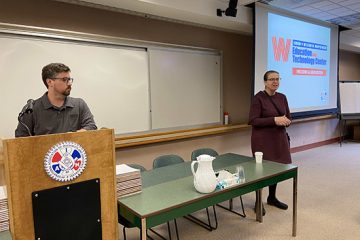Testimony of David Chartrand before the Standing Committee on Trade Canada-United Kingdom Trade Continuity Agreement
David Chartrand’s Testimony to the Standing Committee on Trade Canada-United Kingdom Trade Continuity Agreement
We will pay the price if Ottawa does not learn from its mistakes
February 22, 2021 – In his testimony before the House of Commons Standing Committee on International Trade, the Quebec coordinator of the IAMAW, David Chartrand, denounced the fact that the Canada-United Kingdom Trade Continuity Agreement is a copy of the Economic Treaty with the European Union.
“It’s as if nothing has happened since the Canada-European Union Comprehensive Economic and Trade Agreement (CETA) was adopted in 2014,” said David Chartrand. “ It is as if we are refusing to see the reality we are currently in. Much has changed since CETA was passed, if the government does not take these changes into account today, how can we expect it to do so when negotiating a more definitive agreement?”
In his testimony, the spokesperson for the IAMAW also recalled the many criticisms that have been made of CETA. “Both in Canada and in Europe it has been shown that CETA is far from perfect,” he says. We have a problem with the federal government agreeing to make the same mistakes.”
Several elements of CETA that will be included in the Canada-U.K. Trade Continuity Agreement are problematic. These include the lack of a binding mechanism to enforce workers’ rights, the maintenance of the investor-state dispute settlement mechanism and the provisions governing the management of tendering and the awarding of public contracts that apply to all three levels of Canadian government.
“A free trade agreement that puts economic freedoms ahead of our social and environmental rights is a threat to our health and our quality of life; an economic agreement that undermines our economic pillars is a threat to our jobs and working conditions, and that is exactly what CETA means to us. “
An opportunity for the aerospace sector
The testimony of the representative of IAMAW was an opportunity to remind MPs, members of the international trade committee, that the Canadian aerospace sector is currently in a precarious situation and that it needs federal help.
An opportunity for the aerospace sector
The testimony of the IAMAW representative was an opportunity to remind members of Parliament, members of the international trade committee, that the Canadian aerospace sector is currently in a precarious situation and that it needs federal assistance.
In fact, unlike Canada, the United Kingdom had a national aerospace policy several years ago. This has helped to make the British aerospace sector the 2nd largest in the world. By putting in place a pan-Canadian aerospace policy that would be consistent with trade treaties such as the one with the United Kingdom, the federal government would surely contribute to the recovery of its aerospace sector.
“Whether it is to survive the current crisis or to enjoy the benefits of a trade agreement with the United Kingdom, our aerospace sector urgently needs a sector-by-sector policy and it is the federal government’s responsibility to do so.”, concludes David Chartrand.
Summary of IAMAW recommendations:
• Develop an industrial policy including a pan-Canadian aerospace policy
• Help industry remain globally competitive and access global markets
• Ensure that under Bill C-18, there are Canadian content requirements in public contracts, as well as some form of insurance that allows Canada to intervene to support a struggling economic sector.
• Review and revise problematic chapters of CETA, such as labour rights, government contracts, trade, regulations and quotas.
On the Canada-UK Continuity Agreement (Bill C-18):
- Bill C-18 implementing the Canada-UK Continuity Agreement is a reaction to the UK’s exit from the European Union.
- This agreement, which incorporates the provisions of CETA, is intended to ensure the transition from a commercial relationship with the 28 member countries of the European Union to a commercial relationship between Canada and the United Kingdom.
- Negotiations to reach a more definitive agreement will begin in 2021.
- The bill is supported by Mary Ng, Minister of Small Business, Export Promotion and International Trade.
- Minister Ng indicated that the Continuity Agreement will maintain in place the elimination of tariffs provided for in CETA, priority access to the UK market for Canadian service providers, as well as access to UK government procurement.
- Minister Ng also suggests that the Continuity Agreement will include investor protection provisions.
The Machinists Union (IAMAW) is the world’s largest aerospace union with more than 184,000 members spread over 1,000 collective agreements. Active in Quebec’s aerospace industry since 1940, IAMAW now represents 65% of unionized workers in the sector. We find among others members of Machinists at Bombardier, Airbus, Stelia, Rolls-Royce, Héroux-Devtek, Safran Landing, L3-MAS, AJ-Walter, Air Canada, Air Transat.
-30-
For more information:
Guillaume Valois
Office: (514)-332-1912
Cell: (514)-966-0915
g.valois@aimta712.org
———————-
This article was originally posted on the IAM Canada website. View the original post here: We will pay the price if Ottawa does not learn from its mistakes


